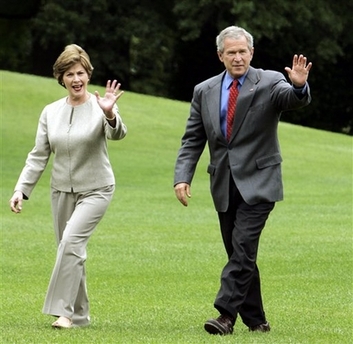Bush, advisers plan future of U.S. in Iraq
(AP)
Updated: 2006-06-12 20:31
Encouraged by the death of a top terrorist leader and
continued progress on the formation of a new government in Iraq, President Bush
is gathering his top military and civilian war advisers to plan the U.S. role in
the country's future.

President Bush and first lady Laura Bush
return to the White House from Camp David, Md., Sunday, June 11, 2006, in
Washington. The top U.S. commander in Iraq said Sunday he does not plan to
ask President George W. Bush for more troops during meetings this week,
but he declined to say whether he would suggest a reduction of his forces.
[AP] |
The president planned two days of meetings at the mountainous Camp David
presidential retreat starting Monday, with national security advisers on hand
and top commanders in Iraq connected by videoconference.
White House officials have said announcements of force reductions are not
expected. Yet the top U.S. commander in Baghdad predicted on the eve of the
meeting that coalition troops will gradually move out of the country in the
coming months.
Gen. George Casey said he thinks it will be possible to withdraw some of the
130,000 U.S. forces in the months ahead as long as Iraq's government and
security forces make progress.
Casey would not say whether he plans to advise Bush on a troop reduction plan
Monday. But the general hinted the time soon may come for such a recommendation.
"I was waiting until we got a government seated before I gave the president
another recommendation so we have some sense of what we've got," Casey said
Sunday on CBS' "Face the Nation."
Iraq's prime minister, Nouri al-Maliki, took office last month and appointed
the key final ministers last week.
Bush has said the new government marks a new chapter in the U.S. relationship
with Iraq. With Republicans worried about losing control of Congress in
November's midterm elections and most Americans saying they would like some
troops to come home, Bush is under pressure. Only a third of respondents to an
Associated Press-Ipsos poll in early June supported Bush's handling of the
situation -- an all-time low.
|